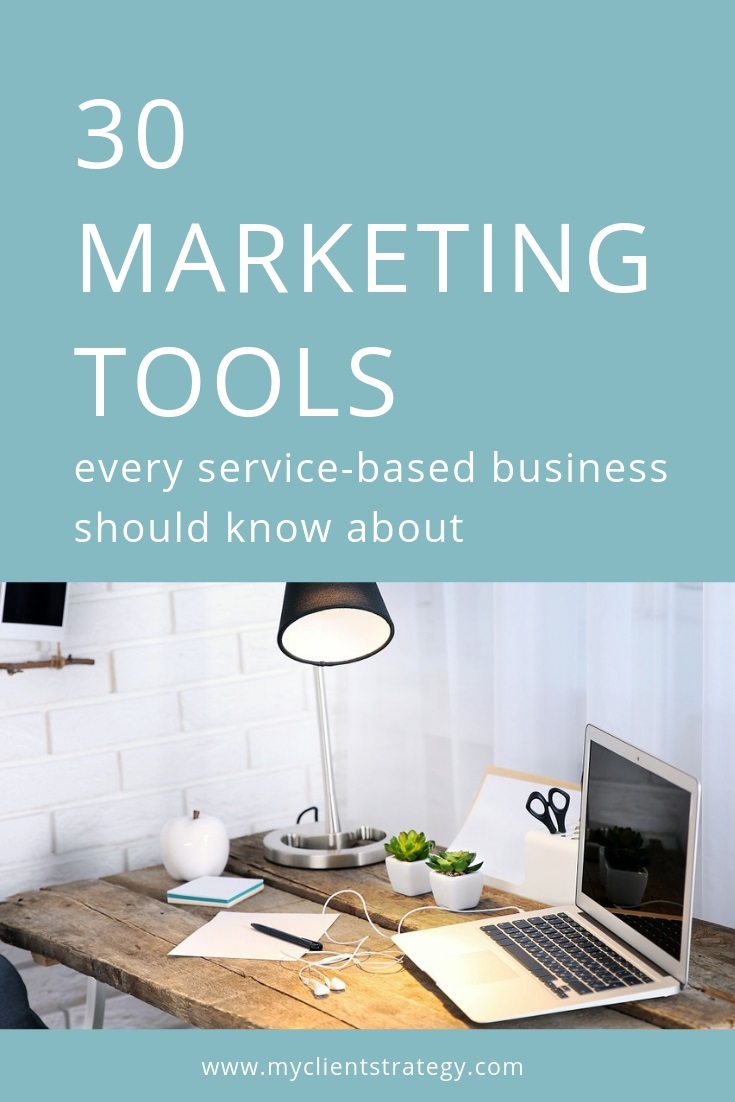30 Marketing tools every service-based business should know about

As a small business owner, you’re likely using some helpful marketing tools.
But you may be short on time to be able to research all the latest ones.
You probably have an endless to-do list, with limited resources to get everything done.
As well as a small budget, which makes it difficult to employ a team.
So, I’ve decided to help you out with this list of 30 brilliant marketing tools, which can help you to save time and get more done.
Most of them are very easy to use, and some are even free!
Keep in mind though that there are many marketing tools and systems to choose from.
While this is the list that I use, I also encourage you to use what feels right for your business and fits within your budget.
As such, for some marketing tools, I have also provided alternatives so that you can compare functionality and costs.
The following list covers the marketing tools I use to:
- Plan each marketing campaign or promotion
- Capture and nurture leads
- Manage and promote my website
- Design and publish social media content
- Research content and SEO keywords
- Track my website analytics and performance
Not sure where to start when it comes to marketing your service-based small business? That’s where I can help. Get started by downloading my free Ultimate Marketing Checklist by clicking the button below:
30 Marketing Tools for Service-Based Small Businesses:
1. Convertkit: My email marketing database and autoresponder. It’s where I store the names and email addresses of my community and leads. The software helps with ensuring I’m legally compliant with privacy rules (which include things such as managing unsubscribes and GDPR).
With Convertkit, I can send broadcast emails to my whole list as well as set up automated email sequences to welcome my subscribers when they first join. Convertkit also has the functionality that allows me to tag and segment my list so that I can send tailored messages.
I find Convertkit easy to use and know that it has the functionality that’s right for my needs at this stage of my business.
Alternatives: MailChimp, MailerLite, Active Campaign, Infusionsoft
RELATED: How to build an email list when you’re first starting out
2. LeadPages: My landing page builder and lead generation software. A high-converting landing page can make all the difference in your business. So, I’ve chosen to invest in LeadPages which is mobile responsive and has optimised designs to help improve my conversion rates.
LeadPages also integrates with Convertkit allowing me to automate both the delivery of my freebie and my welcome email series.
Alternatives: Create landing pages on your website or use the landing pages provided via your email autoresponder (I.e. MailChimp).
A high-converting landing page can make all the difference in your business. #marketingtools Share on X3. OptinMonster: Lead generation software for my website to help capture as many leads as possible. I use the pop-up, hello bar, and exit-intent technology provided by OptinMonster to increase the number of leads I obtain from my website.
Alternatives: Thrive Leads, Sumo
4. AddToAny: A WordPress plugin that adds social share buttons and icons to my website, encouraging users to share my blogs and other content. You’ve probably also noticed the “click to Tweet” reference boxes in this post also. That is another WordPress plugin called Better Click to Tweet.
Alternatives: Social Pug, Social Warfare
5. Asana: An online project management tool that I use to plan my marketing activities. It helps me to map out and track the progress of each task I need to complete – and my productivity has soared since I’ve started using it. I use the free version; however, there are also upgrade versions available to cover the needs of larger teams.
Alternatives: Trello, Monday
6. Canva: A design software tool that I use nearly every day in my service-based business. It’s brilliant for creating social media graphics, training guides, flyers, website graphics, stationery, and more. There are so many professionally designed templates to use. Also, when you upgrade to the Canva for Work option, you can store all your brand elements and designs which saves so much time!
Alternatives: Easil, Stencil, PicMonkey
7. Grammarly: I subscribe to this marketing tool to help with editing, proofreading, and improving my writing in general. Once installed it integrates across MS Office (Word, Outlook) as well as when I’m using Canva, social media, WordPress… practically everywhere!
8. Zoom: I love using Zoom teleconferencing software for discovery sales calls, training sessions, and presentations. It also integrates with Facebook Live video.
I have opted for a paid plan so I can have more than one person on the Zoom teleconference at a time. There’s also the option to upgrade further to the webinar option if required, to capture attendee details, send automated reminders, and access detailed reporting about registrants.
Alternatives: WebinarJam, GoToMeeting, GoToWebinar, EasyWebinar
9. HTML Color Codes: One of my favourite marketing tools that identify HEX colour codes. If you’re ever trying to match a colour from an image, upload it to this site, and it will tell you the HEX code instantly.
Alternatives: Color Picker
Not sure where to start when it comes to marketing your service-based small business? That’s where I can help. Get started by downloading my free Ultimate Marketing Checklist by clicking the button below:
10. TypeForm: An online marketing tool for collecting data from clients or leads. Once you’ve set up your form (it’s free for up to 10 questions), simply send the link to the person you want to fill it out. It can also be a good alternative if you find integrating forms into your website difficult.
11. SurveyMonkey: An online survey and market research tool. It’s important to get the questions right when conducting market research and that’s where SurveyMonkey is brilliant. It has different types of surveys already curated so that you can just choose one and adapt the questions to your business. It’s free for up to 10 questions, and reports summarised results.
It’s important to get the questions right when conducting market research and that’s where SurveyMonkey is brilliant. #marketingtools Share on X12. Bit.ly: An online marketing tool to shorten the length of your URLs. Long URLs look unappealing and take up so much room in a post. Bit.ly is particularly handy for posting URLs into Facebook Ads, so they look great, and for posting on Twitter where there are limited characters available.
13. Tailwind: This is one of the only online marketing tools that Pinterest approves for automated and scheduled Pinning. Another great feature is that when you subscribe to Tailwind, you can join Tribes. These are like group boards where others in the Tribe agree to share your Pins. Smartlooping on Tailwind can also significantly increase the reach and click-throughs your Pins receive.
14. Later: I use this marketing tool for my Instagram scheduling. It has a preview so that I can see what my posts will look like next to each other and achieve an atheistically pleasing feed. The time-saving features that I like include the ability to save captions (so you can reuse them later), and that I can batch create my content.
Later is not a fully-automated tool, in that I still need to post each day via the Later app. However, all my images and text are saved in the app, so it takes no time at all to publish a post.
Alternatives: Hootsuite, Buffer
15. Facebook Publishing Tools: I like to schedule my Facebook Page posts directly into Facebook and find the publishing tools easy to use. I can see both my upcoming scheduled posts as well as published posts.
The page insights within Facebook are also fantastic, in that I can see the type of content that gets the most reach and engagement. With analysis, I can work out what kind of material to post more and less based on reach and engagement.
16. Google Analytics: This is an absolute must-have tool for every business website. It provides information about the visitors to your site including where they’re located, the amount of time they visit for, and the pages they visit the most.
You can also uncover how visitors find your site, by looking at whether they come directly, via social media or the search engines. This marketing tool is also another great source of information for researching SEO keywords.
Google Analytics: This is an absolute must-have tool for every business website. #marketingtools Share on X17. Google Search Console: When you verify your website on Google Search Console, you can gain additional insights about how well the search engines index your website. It will highlight issues and errors you may need to fix so that your site is SEO-friendly.
18. Google My Business: You may have noticed that Google shows around three businesses located on a map in some search results. These businesses are registered on Google My Business, and this tool is especially great for businesses which service a local area.
19. Yoast WordPress Plugin: This marketing tool will make your website SEO setup on WordPress so much easier. It can generate a sitemap for you which assists when it comes to indexing your website with Google.
Yoast also has easy-to-follow data fields for you to enter your titles, meta descriptions, and SEO keywords. There is an advanced version of Yoast, but I find the free version is enough to meet my business requirements.
20. Woorank: Another of my online marketing tools that’ll provide you with a score and recommendations for how to improve the rankings for your site. Just enter your website address, and it will give you a report on what to fix and where to focus.
Alternatives: SEOptimer
Not sure where to start when it comes to marketing your service-based small business? That’s where I can help. Get started by downloading my free Ultimate Marketing Checklist by clicking the button below:
21. Keywords Everywhere: This is a brilliant Google Chrome extension that I find so easy to use for researching SEO keywords. Once installed, it shows me the volume and competitiveness of any keyword that I enter in the Google search. As well as related keywords that are like the search term I used.
This online marketing tool also saves me so much time, as I can tag a keyword when I find one that’s good to use. And then review all my tagged keywords together when it comes time to write a blog post.
Keywords Everywhere: This is a brilliant Google Chrome extension that I find so easy to use for researching SEO keywords. #marketingtools Share on X22. Moz: There are a few ways in which you can use the Moz marketing tools to conduct research and improve your website performance. Two of the functions that I like using are the Keyword Explorer tool and the Backlink Research tool.
You can type in your competitor’s web address and see what keywords they are ranking for and the backlinks they have. It gives you ideas and insights into the types of content you can create to improve your SEO and ranking on Google.
23. Answer the Public: Coming up with blog ideas is easy with Answer the Public. Just type in your blog category or topic, and it will return (sometimes hundreds of) examples of questions that people have typed into Google using that word or phrase.
When used in conjunction with Keywords Everywhere, you can find the most commonly searched for questions to create the most relevant content for your site.
24. BuzzSumo: A market research tool that shows you the blog posts and articles that are most commonly shared on social media. If you type in your area of expertise or one of your blog categories, you’ll see patterns in the types of content that gets the most shares. The objective is then to create similar content to improve your reach.
25. Quora: This question forum is a great marketing tool for longtail keyword research. These are keywords that are 3 or more words long (also called a keyword phrase).
Quora contains an enormous number of questions that users ask about all sorts of topics. Research your area of expertise and see if you can find patterns in the most commonly asked questions so you’ll know what to write your blogs on. Travel-related businesses could also use Trip Advisor which is a similar question forum.
RELATED: How to chose the right keywords for your target market
26. For Display Purposes Only: An online marketing tool that is great to use for Instagram hashtag ideas. It will give you a range of alternative hashtags to use to improve your reach.
27. Vimeo: Embedding videos on your website will slow it down. So, one way to fix this is to host them on another platform. I have a paid Vimeo plan, which allows me to remove the Vimeo branding, so they look better on my site.
28. Camtasia: If you are using video in your marketing (and I encourage you to do so), then Camtasia is an excellent tool for recording and editing them. It isn’t free, however, and I paid a once-off software fee to use it.
29. Voice Recorder (smartphone app): Recording audio via your laptop just doesn’t cut it when you want to present a professional image. I use the Voice Recorder app on my smartphone for audio recordings that I can then add to my videos in Camtasia.
I also use a Blue Yeti microphone when recording presentations and speaking to clients on Zoom.
30. Hotjar: Is an online marketing tool that I use on my website to view heatmaps (of where my visitors click and scroll) and record visitor activity. You can watch recordings to see how your visitors interact with your site, which provides valuable insights on how you could increase conversion rates and sales.
Having the right marketing tools and systems in place in your business is essential.
Yes, it will cost some money upfront. However, these tools will not only save you time but also ensure you’re presenting a professional image to your potential clients to help close sales.
What other marketing tools do you use in your small business? Please share with us in the comments below.
Not sure where to start when it comes to marketing your service-based small business? Download my comprehensive 72-point Ultimate Marketing Checklist which will help make it easier:
Find this article about marketing tools helpful? Don’t forget to PIN to Pinterest so you can refer to it later.




